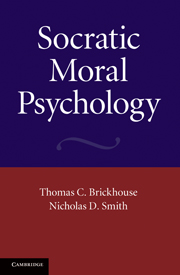Book contents
- Frontmatter
- Contents
- Acknowledgments
- Introduction
- 1 Apology of Socratic studies
- 2 Motivational intellectualism
- 3 The “prudential paradox”
- 4 Wrongdoing and damage to the soul
- 5 Educating the appetites and passions
- 6 Virtue intellectualism
- 7 Socrates and his ancient intellectual heirs: Plato, Aristotle, and the Stoics
- Appendix: is Plato's Gorgias consistent with the other early or Socratic dialogues?
- Bibliography
- Index of passages
- General index
1 - Apology of Socratic studies
Published online by Cambridge University Press: 04 August 2010
- Frontmatter
- Contents
- Acknowledgments
- Introduction
- 1 Apology of Socratic studies
- 2 Motivational intellectualism
- 3 The “prudential paradox”
- 4 Wrongdoing and damage to the soul
- 5 Educating the appetites and passions
- 6 Virtue intellectualism
- 7 Socrates and his ancient intellectual heirs: Plato, Aristotle, and the Stoics
- Appendix: is Plato's Gorgias consistent with the other early or Socratic dialogues?
- Bibliography
- Index of passages
- General index
Summary
INTERPRETING SOCRATIC PHILOSOPHY
A defense of our strategy
I don't know what effect my accusers have had on you, Athenians, but they were speaking so persuasively that I myself almost forgot who I am. And yet they said virtually nothing that's true.
(Plato, Apology 17a1–4)At the 2001 Sixth Annual Arizona Colloquium in Ancient Philosophy, in a prefatory remark before commencing with the reading of his paper, Charles Kahn announced that he thinks that scholars everywhere should simply give up talking about “the philosophy of Socrates.” These are the accusations as we understand them: “Socratic studies invents a bogus philosopher by the name of Socrates and it does so by means that are completely at odds with proper historical or hermeneutical technique. In doing so, Socratic studies corrupts the minds of students and scholars.” On the basis of such accusations, Kahn and other critics of Socratic studies would condemn to death the research program to which many scholars, including us, have devoted their work for many years.
In this book we propose to offer a new interpretation of a central aspect of the philosophy of Socrates. This project, plainly, presumes that there is something to which “the philosophy of Socrates” refers. If recent critics are correct, however, our project is groundless and ill-conceived from the start; there is no “Socratic philosophy,” no “Socratic moral psychology,” no “Socratic motivational intellectualism” to interpret, either in novel or standard ways.
- Type
- Chapter
- Information
- Socratic Moral Psychology , pp. 11 - 42Publisher: Cambridge University PressPrint publication year: 2010



